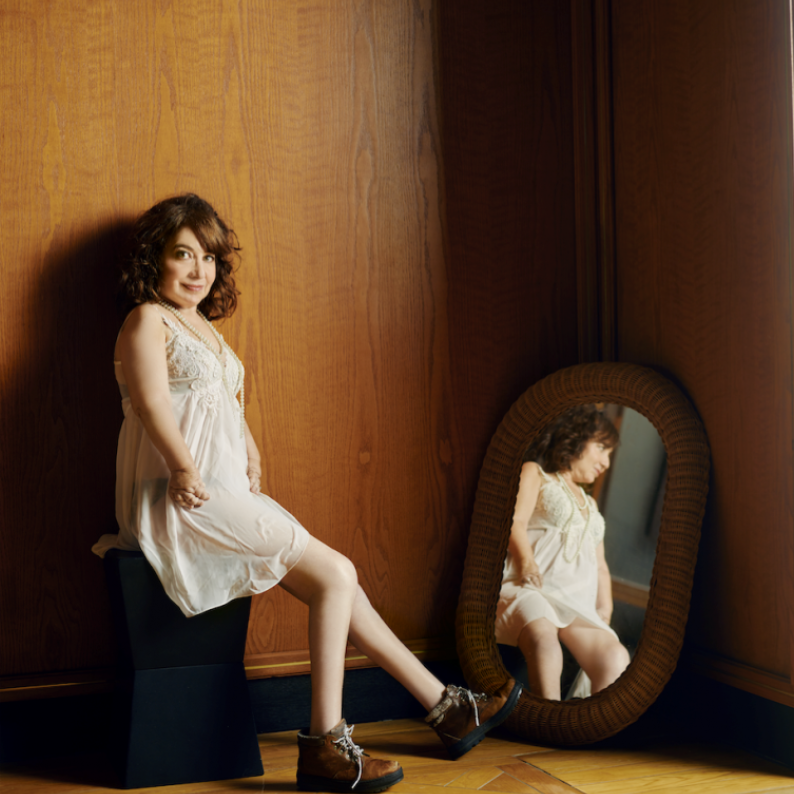Don't forget to love yourself - Olivia P.


Description:
The photo shows a lady posing Infront of a mirror in a lace dress. She is done up, smiling and radiates sexiness while slightly showing off her disability. When looking at the mirror more of her skin is shown and her facial expression has changed. It’s showing what she hides.
Significance:
I chose this artifact because it shows the intersectionality between sexuality and disability and a lady breaking the negative stigma around sex and disability.
I feel as if the artifact strongly shows the depth of sexuality and disability and the hidden messages and pressures society has on people expressing the two together. When you first look at the image you see a lady posing in lingerie, showing her sexy side, embracing her body and showing a little bit of her ‘imperfections’ while the image in the mirror shows the opposite. The mirror shows the lady with a blunt and muted facial expression, zooms in on her body and shows her physical disabilities or impairments a lot more. I believe the artifact is significant because it is showing the drastic contrast between the two images. It is telling a story about how at first glance, society and herself see this beautiful, abled looking body side of her, who is sexual while the other side of her which is not shown until looking in the mirror is either hidden or the only thing people look at and notice when meeting her. The artifact can also be showing how people with a disability want to present themselves to society and how they feel internally. To everyone else, they want to be seen as able-bodied, attractive and needed while on the inside and or at home, they are faced with their disability and the possible shame that comes with it.
Positionality:
I am interested in Disability and Sex because they are topics I have not been exposed to throughout my life and as a social worker and future psychologist, I believe having a strong grasp on the intersectionality between the two is extremely important. I want to be able to challenge social norms about these topics through my work and understand my future clients and patients on a deeper level. I am also interested in disability and sex because I want to continue to help the movement and advocate.
My interest in disability and sex originates from my childhood as I was not surrounded by either topic. Throughout my schooling life when I was only ever exposed to disability and sex/sexuality as separate topics and the information we learnt about was quite basic. I have grown up to be extra careful around someone with a disability and to not engage in sexual activity until I was married. When in reality there is so much more than this and I was lacking general knowledge and skills.
I also am interested in disability and sex because both communities are prominent and I want to enhance my knowledge so I ensure I treat everyone correctly and appropriately in both a professional and casual environment. Expanding my knowledge on the history of disability acts, prominent figureheads and the wide spectrum that encapsulates sexuality will allow me to advocate for rights of these communities, work with more groups and allow me to join the fight for equal rights.
Impact:
This subject has impacted me significantly. Not only is it a breath of fresh air but it also allowed to me step out of my body and reassess what I have learnt and haven’t learnt during my schooling years to how I am now.
The subject has opened my eyes to the different realities that people with a disability live with and how people are fighting for love and to love. Simple acts I don’t think twice about before doing are for some people merely impossible to partake in because it is too painful and draining or they are under constant scrutiny and feel they have no right to do so. Miserandion (2003) highlights this constant struggle through her spoon theory. After a daily task is completed, a spoon is taken away and she can’t get it back. There is a neglect of pleasure for disabled people because of assumptions that they are childlike or asexual. If they are physically disabled, they are unable to love (Tepper, 2000). This shines a light on the privileges able-bodied people live with while people with a disability are stripped of basic rights. DeMirjyn (2018) talks about Maria’s journey to exposing abled-bodied people to how disability encapsulates sexuality. Society tends to shun and label people with a disability as asexual or not capable of sex. Through Maria’s poetry and stage, performance has disrupted the heteronormative paradigms I have constantly been exposed to and highlighted how misunderstood the disabled community is when it comes to sex/sexuality.
Wish List:
I hope my artifact inspires the audience to see that no matter your physical appearance or stereotypes and prejudice you face, it should never stop you from being who you truly are and expressing yourself freely. This artifact should show you that all individuals are capable to give and receive love and pleasure. I hope my artifact shows and teaches the viewers that people with a disability are not different from able-bodied people. There is a common misconception society has created that you need to be more careful around disabled people, treat them kinder, you should feel sorry for them and treat them like charity cases. When the reality is, disabled people are no different from the rest. Everyone deserves to be treated with the same respect.
I also hope my artifact makes the viewers question social and cultural norms and stereotypes they have been surrounded by and realize how society deems people with a disability as less than, not capable or asexual as wrong. Burnes et al. (2017) stated that people need to be aware of how their culture, context and environment shape how they view people, themselves and topics like sexuality and disability. I hope after seeing my artifact it inspires people to take a step back and reassess their values and opinions about what they think disability and sexuality are, how they interlock and hopefully educate themselves more to get a better understanding. Doing so, it will allow for more growth and positivity towards self and relationships.
Comments are closed.



One Comment
You have done a great job; your project looks amazing! I liked the artifact title DON’T FORGET TO LOVE YOURSELF, when we love and value ourselves, we accept who we are.
I liked your way of describing the image of the lady who is posing Infront of the mirror, showing her sexy side of her body and her physical disability impairment.
Challenging social norms on disability is about changing mindsets.
Tom Shakespeare emphasized that the problem of disability and sexuality have nothing to do with the bodies shapes differences, but the matter is with the society which we live in” (2020, p.161).
As you care about your work, understanding your future clients and patients on a deeper level, certainly, you will achieve success in your social work .
I wish you the best of luck in the next step of your career.
Don’t forget to love yourself